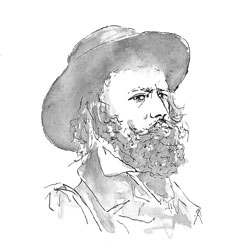Music and Meaning (2): Tennyson’s Voice and ‘Declamation’
http://www.poetryarchive.org/poetryarchive/singlePoem.do?poemId=1570
[Tennyson reading 'The Charge of the Light Brigade', from the Poetry Archive; start the recording and then tab back to this page to read on.]
We have Thomas Edison to thank for this recording of Tennyson reading his own poem, 'The Charge of the Light Brigade'. According to the BBC, 'Edison sent his agents round to the Poet Laureate's home to record his voice on wax cylinders in 1890', and the result of their visit was the pre-electronic recording that you're listening to now.
Listen to the voice of the eighty-one year old Poet Laureate and think about how you would characterise it: is it strong? Is it 'musical'? Considering how this voice was recorded (using 23 soft wax-cylinders), is it not surprising how powerful it sounds?
According to the 'Poetry Archive' webpage, 'Tennyson's voice comes through clearly, intoning the pounding dactylic rhythms of the verse which gives it a breathless momentum'. A dactyl is a type of metre in poetry, which (in accentual verse, like English) consists of one stressed syllable, followed by two unstressed syllables; can you hear this on the recording? What do you think it means to say that Tennyson intones this rhythm? Why might it be significant that this voice produces an effect of 'breathless momentum'?
In a chapter of The Printed Voice of Victorian Poetry tellingly entitled 'Tennyson's Breath', the literary critic Eric Griffiths explores 'the centrality of respiration, and other physical motor-rhythms, to Tennyson's poetry'. Griffiths there summarises how Tennyson is often 'thought to be preoccupied with word-music, with fondling, as it were, the bodies of words, to the exclusion or detriment of responsible thought'. What do you think he might mean by this? How might this idea relate to Arthur Hallam's, that Tennyson is a poet of 'Sensation' as opposed to 'Reflection'?
If Tennyson is a poet of 'Sensation', then perhaps we might expect his 'word-music' to be less concerned about meaning than writing is in general and to be, therefore, irresponsible or intellectually empty. Griffiths develops a more complex argument about the nature of Tennyson's poetic thought and writing, however. For him, 'Tennyson thought in melody, and did so because his preoccupation with self-identity over time and beyond time drew him down repeatedly to an encounter with the human body itself as the crucial location of his thinking'. This suggests there is something very sensible about Tennyson's sensuousness. What do you think about this idea, that Tennyson might have been using his poems to make readers think about breathing and melody? It could be that Tennyson wanted his readers to realise that we are essentially embodied, breathing creatures, just as much as we are thinking creatures. Maybe it is precisely Tennyson's point that we, humans, are never purely intellectual beings: even as we think we breathe and even as we talk - as much as we might try to keep our minds on the matter at hand - our voices create melodies.
A young composer and friend of Tennyson's (by the name of Sir Charles Stanford) once described the poet's reading voice as one of 'deep and penetrating power, varied only by alternation of note and by intensity of quality'. 'Without being a musician', Sir Charles' essay on 'Music, Tennyson and Joachim' continues, Tennyson had 'a great appreciation of the fitness of music to its subjects, and was an unfailing judge of musical declamation'. Declamation being the public recital of an artfully prepared speech or piece of music, perhaps this might again be a sign that Tennyson cared as much about how his poetry sounded as he did about what it said. Indeed, according to Angela Leighton Tennyson 'pushes language almost as far as it will go into music': his 'rhymes and echoes ring on', she says, 'on the other side of sense'.
What does all this make you think about the 'music of' Tennyson's poetry? Do you think that Tennyson believed that it didn't matter what one said so long as it sounded beautiful, or do you think he might have been using his verse to suggest something more complex about the interdependence of music and thought?
Highlighting his verse's 'musical qualities', Tennyson's composer friend claimed that 'it is the perfection of vowel balance which makes his poetry so difficult to set to music satisfactorily. So musical is it in itself that very little is left for actual music to supply'. Now click on this link and listen to Loreena McKennit's version of 'The Lady of Shalott' [http://www.youtube.com/watch?v=QMazwBCa9yU&feature=related]. Thinking about how this sounds, do you agree with Sir Charles that 'all that music has to do [in support of Tennyson's poetry] is to illustrate the surrounding atmosphere, and to leave the poetry to tell its own story with its declamation and inflectives accurately preserved'.
Once you've finished thinking about what the musical quality of Tennyson's poetry might suggest about the relationship between music and thought, click on the link and we'll begin exploring what Tennyson actually says about music in his poetry.
[Go on to Music and Meaning (3): Mind and Melody in 'To Poesy' and Poems, Chiefly Lyrical]
